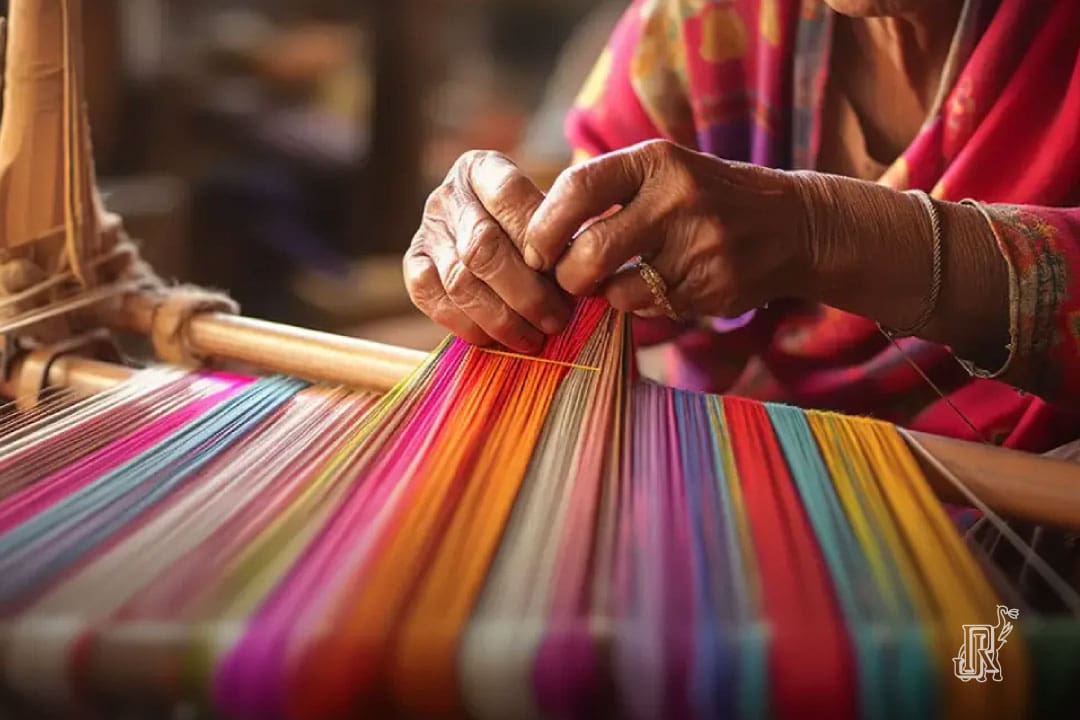|
Getting your Trinity Audio player ready...
|
Long India’s carpet industry has been a symbol denoting the artistic heritage and craftsmanship. Artistry helped nationwide woolen carpets and Indian rugs to become successful and gain popularity. The loom is more than just a business; it is a cultural legacy being passed down from grandfathers to their grandsons. Carpet weaving, however, has been a male-dominated field, women’s role in the industry has always been crucial but also often ignored.
Nowadays, female artisans play a great role in the industry, thus they are turning into artists and have self-reliant status in India’s carpet industry. This blog explores the role of women in weaving, their impact on India’s carpet industry, and how organizations like J.R. Exports are championing their empowerment.
Table of Contents
ToggleThe Historical Role of Women in Carpet Weaving
Origins of Women’s Involvement
The history of carpet weaving in India stretches back to the golden days of the Mughal Empire when mobs of dexterous artificers executed maze-like combinations drawn from Persian and native designs. These days, we rarely come across men’s names that would stand out when they finish a carpet. The female wing, besides courage, was responsible for nurturing the talent. The women were most often in the business of spinning wool, dyeing thread, and elating the whole ‘completing the carpet’ scheme.
Cultural Significance
Women’s involvement in weaving was deeply rooted in rural India, where it became a means of preserving cultural identity. From Rajasthan to Uttar Pradesh, female artisans infused unique regional patterns into handmade rugs and carpets, enhancing their distinct appeal.
Evolution of Roles Over Time
With modernization, carpet weaving has transitioned from small household practices to organized manufacturing. Women have moved beyond supporting roles to becoming primary weavers, trainers, and even entrepreneurs in India’s carpet industry. This shift has opened doors for greater financial independence and recognition.
Empowering Women Through Weaving
Economic Independence
Carpet weaving is a consistent source of income for many women in rural India due to the nature of their working conditions. Unlike their industrial counterpart, the process of weaving allows rural artisans to work from home. It offers them a way to juggle motherhood duties while also earning a living. Handmade rugs and carpets have come to be one of the best-known ways for women to get rich in the regions, which are mostly dependent on natural resources with inadequate employment opportunities.
Social Benefits
Beyond financial security, weaving fosters a sense of community among female artisans. Women-led weaving collectives create safe spaces for mentorship, learning, and social interactions, breaking barriers of isolation.
J.R. Exports’ Initiatives
J.R. Exports, a leading name among rug exporters in India, actively supports female artisans through various initiatives:
- Fair wages: Ensuring women receive equal pay for their craftsmanship.
- Skill development programs: Training women in advanced weaving techniques to enhance their expertise.
- Community outreach: Supporting self-help groups to promote sustainable weaving practices.
Challenges Faced by Female Artisans
Gender Inequality in Wages
Despite their significant contributions, women in carpet weaving often face wage disparities compared to their male counterparts. Many remain underpaid, despite producing high-quality Indian carpets that are in demand globally.
Lack of Access to Resources
Regularly, demand for raw materials has caused female artisans to be the most in need. Small-scale weavers are the main ones who are alone as compared to mass production, the situation of these female art couture creators. Consequently, this is believed to increase the difficulty for them to grow.
Socio-Cultural Barriers
Traditional mindsets in some rural communities restrict women from pursuing weaving as a profession. Many are expected to prioritize household duties, limiting their ability to engage in full-time carpet weaving.
Success Stories of Women Weavers
Inspiring Profiles
Some women have broken social stereotypes to become expert craftsmen and receive prestigious prizes for their skills. As an illustration, the women who live in Bhadohi, the largest city in India’s carpet industry production, from their dying units, carpet a huge part of the financial market and, as a result, are the main suppliers for those who have their weaving businesses.
Testimonials from Artisans
A weaver from Rajasthan shares: “Before joining a weaving collective, I depended entirely on my husband’s income. Now, I contribute to my family’s earnings, and my children can continue their education.”
Community Impact
Entire villages have benefited from increased female participation in the weaving India’s Carpet Industry. Access to consistent employment has led to improved living standards, better healthcare, and educational opportunities for artisans’ children.
The Role of Organizations in Supporting Women Weavers
Government Programs
India’s Carpet Industry government has introduced various schemes to support female artisans, including:
- The Handicrafts Sector Skill Council (HSSC): Offers specialized training for women in traditional crafts.
- Mudra Yojana: Provides micro-financing options to empower women entrepreneurs in carpet weaving.
Non-Profit Advocacy
Such as The All India Artisans and Craftworkers Welfare Association (AIACA), which works on behalf of the poor people, to ensure fair trade practices, attributed to ethical sourcing of hand-knotted carpets and fair wages for female spinners.
J.R. Exports’ Contributions
J.R. Exports has taken proactive steps to uplift women in India’s carpet industry by:
- Partnering with rural weaving communities to provide market access.
- Implementing ethical labor policies to eliminate exploitation.
- Promoting sustainable practices that empower women artisans.
The Future of Women in India’s Carpet Industry
Emerging Trends
The preference for authenticity and handicrafts is increasing worldwide, thus, providing opportunities for women weavers. The trend is in favor of handmade Indian rugs made by artists, a contribution that women are taking home.
Opportunities for Women-Led Initiatives
Women-led cooperatives and businesses are on the rise, allowing artisans to take control of production and sales. Digital platforms also enable female weavers to sell directly to international customers, bypassing middlemen.
J.R. Exports’ Vision
The exact term J.R. Exports uses acts out the futurist in a way, where the women make up the larger part of the India’s carpet industry. The goal of the company is to expand the market by investing in training programs, providing access, and speaking up for gender equality so that the future will be a more inclusive and sustainable weaving industry.
Conclusion
The female workforce has gone beyond merely the empowerment of women in India’s carpet industry, to change it through the introduction of new processes, resilience, and unmatched innovation that has led to global market success. J.R. Exports and similar organizations, such as, have improved the lives of women artisans by ensuring that they receive fair wages, are trained, and are exposed to global markets. Women weavers’ employment in India’s Carpet Industry is always changing.
Economically empowering women through weaving will not only ensure the future of India’s historic textile heritage but will also usher In a brighter future for the coming generations. As a result of our patronage of these female artists, the handmade rugs and carpets sourced from ethical farms will contribute to a greener world and a more equitable industry.
Explore the exquisite collection of Indian carpets and support women artisans with J.R. Exports today!




